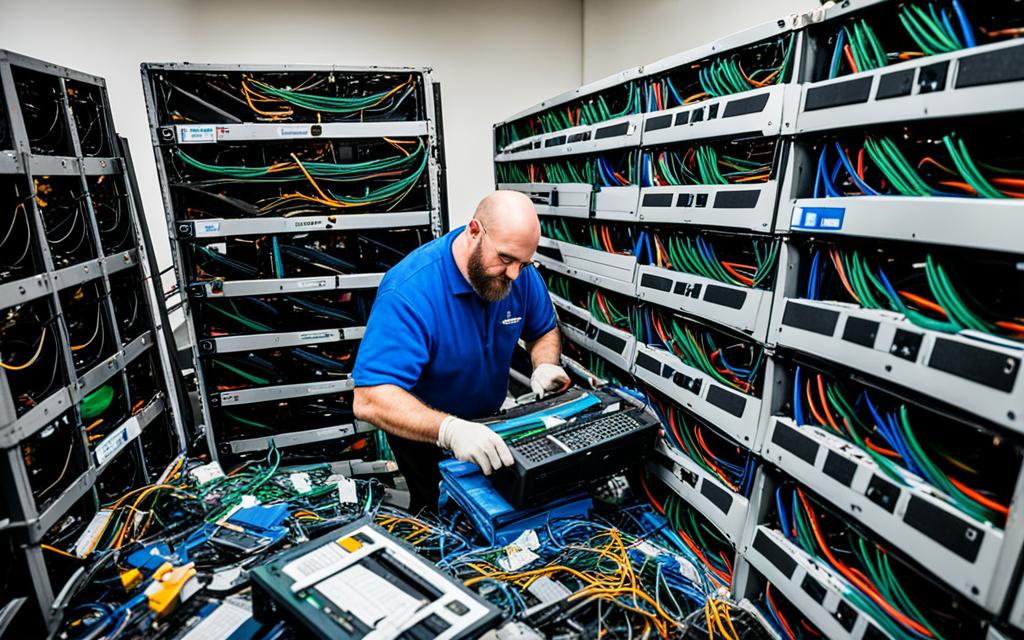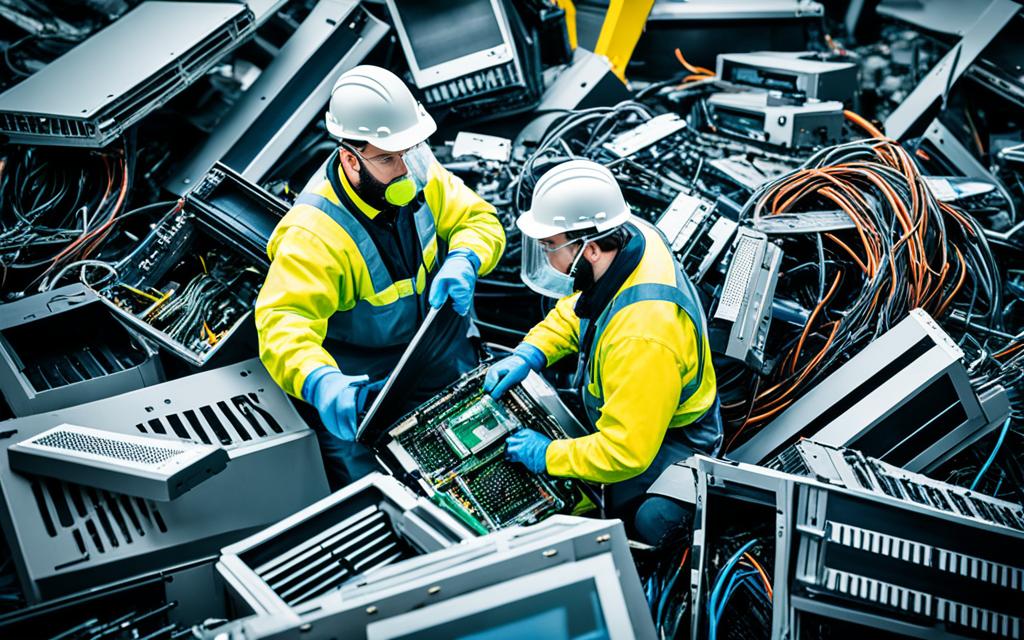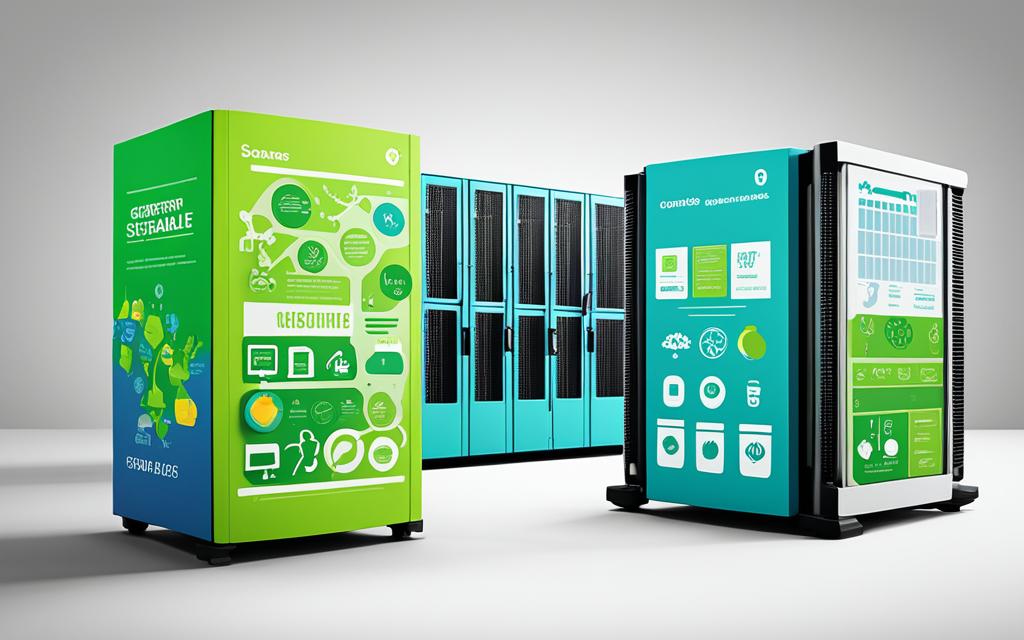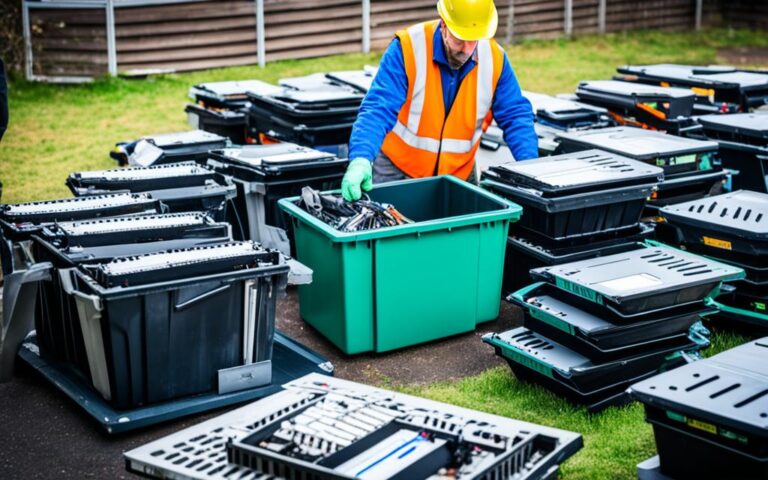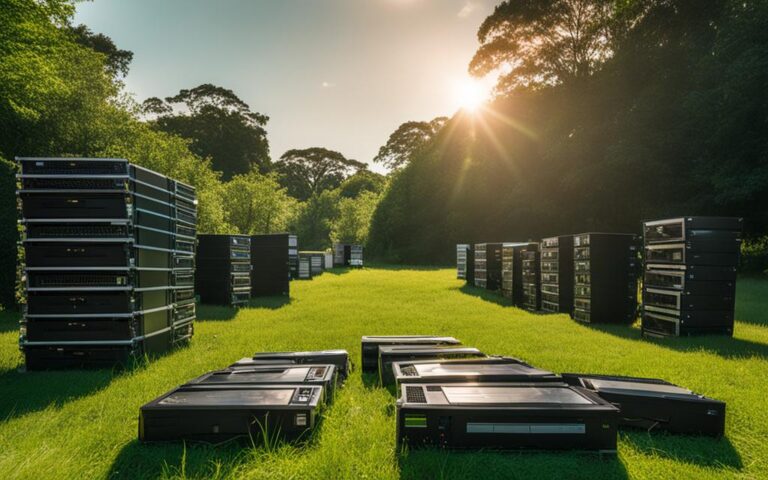The Role of Server Recycling in Managing IT Asset Lifecycles
Responsible disposal of outdated servers is crucial in managing the IT asset lifecycle and reducing electronic waste. Server recycling plays a significant role in minimizing environmental impact, conserving resources, and protecting sensitive data. By implementing effective server recycling strategies, businesses can optimize their IT infrastructure while contributing to a more sustainable future.
In today’s technology-driven world, organizations rely heavily on servers to store and process vast amounts of data. However, as technology evolves rapidly, old servers become obsolete and need to be replaced. This constant turnover of equipment contributes to the accumulation of electronic waste, which poses significant environmental challenges.
Server recycling addresses this issue by promoting the proper disposal and reuse of outdated servers. Recycling not only reduces the amount of e-waste that ends up in landfills but also conserves valuable resources used in server production.
In addition to environmental benefits, server recycling also plays a critical role in protecting sensitive data. Servers contain a wealth of confidential information, including customer records, financial data, and intellectual property. Failure to dispose of servers securely can result in data breaches and potential legal and financial consequences for businesses.
By partnering with reputable server recycling providers, such as Data Network, organizations can ensure that their servers are properly assessed, securely erased, and recycled in accordance with industry standards. This approach not only mitigates the risks associated with data breaches but also demonstrates a commitment to data security and compliance.
Overall, server recycling is an essential component of responsible IT asset management. It enables businesses to optimize their IT infrastructure, minimize environmental impact, protect sensitive data, and maintain compliance with regulations. By embracing server recycling, organizations can contribute to a more sustainable future while reaping the benefits of efficient and secure IT operations.
The Need for Server Recycling
The rapid growth of the IT industry has led to a surge in electronic waste worldwide. Businesses frequently replace servers that have reached the end of their useful life, contributing to the accumulation of e-waste. Server recycling addresses this issue by reducing e-waste, conserving valuable resources, and ensuring the secure disposal of sensitive data.
“The accumulation of e-waste poses a significant environmental challenge,” says Jane Smith, an environmental advocate. “By implementing server recycling programs, businesses can actively contribute to reducing electronic waste and conserving resources while also protecting sensitive data.”
Server recycling is a sustainable solution that involves the responsible and eco-friendly disposal of outdated servers. Data from various sources demonstrates the positive impact of server recycling on the environment and the significance of protecting sensitive data:
Reducing E-Waste
The IT industry’s rapid advancements contribute to the generation of substantial e-waste. Server recycling helps reduce the amount of electronic waste that ends up in landfills or is improperly disposed of. Through proper recycling processes, valuable materials can be recovered and reused, reducing the need for raw material extraction and the associated environmental impact.
Conserving Resources
Server recycling allows for the recovery and reuse of valuable resources. By extracting and repurposing materials from outdated servers, businesses can reduce their dependence on finite resources, such as minerals and metals. This conservation of resources contributes to a more sustainable and resource-efficient IT industry.
Protecting Sensitive Data
Data security is a critical concern for businesses when disposing of servers. Improper handling of servers can result in data breaches, putting sensitive information at risk of being compromised. Server recycling processes ensure the secure erasure of data, providing businesses with peace of mind that their sensitive information will not fall into the wrong hands.
| Benefits of Server Recycling | Server Recycling | Improper Disposal |
|---|---|---|
| Reduces e-waste | ✓ | ✗ |
| Contributes to resource conservation | ✓ | ✗ |
| Protects sensitive data | ✓ | ✗ |
| Environmental responsibility | ✓ | ✗ |
The Data Network Server Recycling Process
At Data Network, we have developed a comprehensive and efficient server recycling process that ensures environmentally responsible disposal, secure data erasure, and compliance with industry standards and regulations.
- Assessing Servers: Our first step is to assess the servers for potential reuse or recycling. This evaluation allows us to determine if any components can be salvaged or repurposed.
- Secure Data Erasure: Protecting sensitive data is a top priority. We employ industry-leading data erasure methods to ensure that all data stored on the servers is completely eradicated, leaving no traces behind.
- Disassembly and Sorting: Once the data has been securely erased, we proceed with disassembling the servers. This allows for efficient sorting and separation of various components and materials for further processing.
- Material Recovery: Our recycling process emphasizes material recovery. We identify and extract valuable materials from the servers that can be reused in the manufacturing of new products.
- Certified Recycling Facilities: Any remaining materials that cannot be repurposed or reused are sent to certified recycling facilities. These facilities adhere to rigorous environmental standards, ensuring that the disposal process is both sustainable and responsible.
By following this thorough server recycling process, we contribute to the reduction of electronic waste, conserve valuable resources, and play our part in promoting environmental sustainability. Moreover, our commitment to secure data erasure guarantees the protection of sensitive information, mitigating the risk of data breaches.
| Server Recycling Process | Benefits |
|---|---|
| Assessment of servers | Potential reuse or recycling |
| Secure data erasure | Protection of sensitive data |
| Disassembly and sorting | Efficient separation and processing of components |
| Material recovery | Reuse of valuable materials |
| Certified recycling facilities | Environmentally responsible disposal |
Our server recycling process ensures that all aspects of the disposal journey are handled responsibly, from the assessment of servers to the recycling of materials. By partnering with Data Network, you can have peace of mind knowing that your outdated servers are being handled with care and consideration for the environment.
Benefits of Data Network’s Server Recycling Service
By partnering with Data Network for server recycling, businesses can reap numerous benefits. Not only does server recycling allow companies to demonstrate their commitment to environmental responsibility, but it also ensures data security, compliance with e-waste regulations, and avoidance of potential fines and legal repercussions. Furthermore, server recycling promotes sustainable IT asset management, minimizes environmental impact, and safeguards sensitive data.
Environmental Responsibility
- Reduce electronic waste: Server recycling ensures that outdated servers are disposed of responsibly, minimizing the accumulation of electronic waste and its harmful effects on the environment.
- Conservation of resources: Recycling servers allows for the recovery of valuable materials, reducing the need for extracting and processing raw materials, and conserving natural resources.
Data Security
- Secure data erasure: Data Network employs robust data erasure methods to ensure that sensitive information stored on servers is permanently and securely deleted, mitigating the risk of data breaches.
- Protection of sensitive data: Through server recycling, businesses can rest assured that their confidential data remains secure throughout the disposal process, preventing unauthorized access and potential data leaks.
Compliance
- E-waste regulations: Server recycling with Data Network enables businesses to comply with various e-waste regulations, avoiding non-compliance penalties and adhering to ethical and legal obligations.
- Industry standards: Data Network follows industry best practices and standards for server recycling, ensuring compliance with relevant regulations, certifications, and environmental guidelines.
Partnering with Data Network for server recycling offers a holistic approach to sustainable IT asset management, encompassing environmental responsibility, data security, and compliance. By choosing server recycling, businesses can make a positive impact on the environment, contribute to the circular economy, and safeguard their data with confidence.
How Server Recycling Works
In the server recycling process, responsible disposal and valuable material recovery are prioritized to minimize environmental impact and promote sustainability. Here is a step-by-step overview:
Assessment of Server Condition
Before recycling, servers are carefully assessed to determine their condition. This evaluation helps identify servers with potential for reuse, reducing the need for new equipment production.
Secure Data Erasure
Sensitive data stored on the servers is securely erased to ensure the protection of confidential information. Advanced data erasure techniques are employed to guarantee data security and mitigate the risk of data breaches.
Disassembly of Servers
Servers are disassembled into their various components and parts. This disassembly process allows for better sorting, recycling, and recovery of valuable materials.
Recovery of Valuable Materials
During the disassembly stage, valuable materials such as precious metals, copper, and other components are carefully extracted and recovered for reuse. This step contributes to a more sustainable approach by reducing the demand for virgin materials in the production of new products.
Responsible Recycling
Any remaining materials that cannot be reused are sent to certified recycling facilities for proper disposal. These facilities adhere to strict environmental standards and regulations, ensuring that hazardous substances are handled safely and responsibly.
This server recycling process promotes responsible disposal, reduces e-waste, and fosters the recovery of valuable materials for future use. By implementing these practices, businesses can actively contribute to environmental sustainability and the circular economy.
| Benefits of Server Recycling | Environmental Responsibility | Data Security | Compliance |
|---|---|---|---|
| Responsible disposal of outdated servers | Promotes sustainability and minimizes environmental impact | Protects sensitive data through secure erasure | Maintains compliance with e-waste regulations |
| Potential reuse of servers | Reduces the need for new equipment production | Minimizes the risk of data breaches and legal repercussions | Avoids potential fines and penalties |
| Recovery of valuable materials | Conserves natural resources by reusing extracted materials |
Risks of Improper Disposal of IT Servers
Improper disposal of IT servers can have severe consequences, posing risks to both the environment and sensitive data. These risks include environmental hazards and data breaches, which can have far-reaching impacts on individuals, businesses, and the wider community.
Environmental Hazards
Improperly disposing of IT servers can result in significant environmental hazards. When servers end up in landfills or are incinerated, they can release toxic substances into the soil, water supply, and air. These substances include heavy metals, such as lead, mercury, and cadmium, which contribute to environmental degradation and climate change. The leaching of these hazardous materials can contaminate ecosystems, impact biodiversity, and harm human health.
Proper server recycling is essential to mitigate these environmental risks. By recycling servers through certified facilities, valuable materials can be recovered and reused, reducing the demand for new resources and minimizing the environmental impact of server disposal.
Data Breaches
Improper disposal of IT servers also poses a significant risk of data breaches. When servers are not securely wiped or destroyed, they may still contain sensitive information, including personal records, financial data, and intellectual property. Unauthorized individuals gaining access to this data can result in identity theft, corporate espionage, and reputational damage for the businesses affected.
Secure data erasure is a crucial step in the server recycling process to prevent data breaches. Through proper protocols and advanced techniques, sensitive data can be effectively eliminated, ensuring that it cannot be recovered or misused.
“Proper server recycling is essential to protect both the environment and sensitive data. By ensuring responsible disposal and secure data erasure, businesses can mitigate the risks of environmental hazards and data breaches.”
The Importance of Proper Server Recycling
Proper server recycling is crucial to protect the environment, safeguard sensitive data, and promote sustainable practices. By partnering with reputable service providers like Data Network, businesses can mitigate the risks associated with improper server disposal while contributing to a more sustainable IT industry.
| Benefits of Proper Server Recycling |
|---|
| Promotes environmental sustainability by reducing e-waste |
| Protects sensitive data through secure data erasure |
| Ensures compliance with regulations and avoids fines |
| Contributes to the circular economy by recovering valuable materials |
By adopting responsible server recycling practices, businesses can demonstrate environmental stewardship, mitigate environmental hazards, and prevent costly data breaches. It is essential for companies to prioritize proper server disposal and partner with trusted specialists to ensure the protection of sensitive information and the preservation of our environment.
Next Steps: Secure and Sustainable Server Recycling
To protect your business and the environment, it is important to partner with a trusted provider like Data Network for secure and sustainable server recycling. By choosing a responsible recycling solution, you can mitigate the risks of improper server disposal, contribute to a circular economy, and promote a greener future.
Conclusion
Server recycling is a critical aspect of responsible IT asset management. By partnering with a trusted provider like Data Network, businesses can optimize their IT infrastructure, minimize environmental impact, and contribute to a more sustainable future.
Server recycling promotes environmental sustainability by reducing e-waste and conserving valuable resources. It also plays a crucial role in protecting sensitive data through secure data erasure, ensuring compliance with regulations and safeguarding against potential data breaches.
By incorporating server recycling into their IT asset management strategy, businesses can demonstrate their commitment to environmental responsibility and contribute to a circular economy. Additionally, they can avoid potential fines and legal repercussions associated with improper server disposal.
Overall, server recycling is an essential practice for businesses to adopt in order to achieve long-term environmental sustainability, maintain data security, and comply with regulations. Through responsible IT asset management, businesses can make a positive impact on the environment while optimizing their operations.
FAQ
What is server recycling?
Server recycling is the process of responsibly disposing of outdated servers to manage the IT asset lifecycle and reduce electronic waste. It involves assessing the servers for potential reuse or recycling, securely erasing sensitive data, disassembling and sorting the servers, recovering valuable materials for reuse, and sending any remaining materials to certified recycling facilities.
Why is server recycling important?
Server recycling is crucial in managing the IT asset lifecycle, reducing electronic waste, and conserving valuable resources. It also plays a significant role in protecting sensitive data by ensuring its secure disposal.
What does the server recycling process at Data Network involve?
The server recycling process at Data Network involves assessing the servers for reuse or recycling, securely erasing sensitive data, disassembling and sorting the servers, recovering valuable materials for reuse, and sending any remaining materials to certified recycling facilities. This process ensures environmentally responsible disposal, secure data erasure, and compliance with industry standards and regulations.
What are the benefits of Data Network’s server recycling service?
By partnering with Data Network for server recycling, businesses can demonstrate environmental responsibility, ensure data security through secure data erasure, maintain compliance with e-waste regulations, and avoid potential fines and legal repercussions. Server recycling promotes sustainable IT asset management while minimizing environmental impact and protecting sensitive data.
How does server recycling work?
Server recycling involves assessing the condition of servers, securely erasing data, disassembling servers, recovering valuable materials for reuse, and sending any remaining materials to be recycled responsibly. This process ensures responsible disposal, reduces e-waste, and promotes the recovery of valuable materials for reuse in manufacturing new products.
What are the risks of improper disposal of IT servers?
Improper disposal of IT servers can lead to environmental hazards, such as the leaching of toxic substances into the soil and water supply, contributing to environmental degradation and climate change. It also poses a risk of data breaches, exposing sensitive information and potentially leading to identity theft and corporate espionage. Proper server recycling is essential to mitigate these risks.
Why is server recycling important for IT asset management?
Server recycling is a critical aspect of responsible IT asset management. It promotes environmental sustainability, reduces e-waste, protects sensitive data, and ensures compliance with regulations. By partnering with a trusted provider like Data Network, businesses can optimize their IT infrastructure, minimize environmental impact, and contribute to a more sustainable future.



